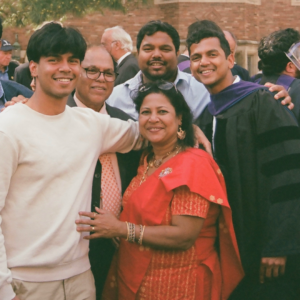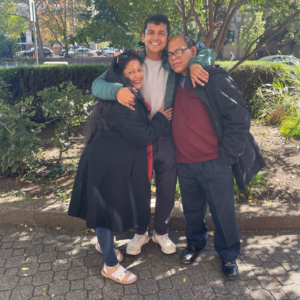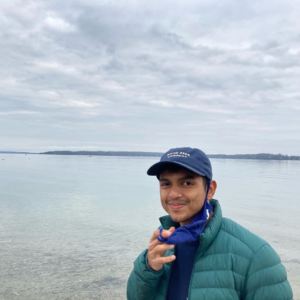
Meet Students’ Civil Rights Project Fellow Shariful Khan
Shariful Khan is a Skadden Fellow with Public Justice’s Students’ Civil Rights Project. In addition to litigating Title IX and VI cases with the SCRP team, Shariful’s fellowship focuses on drawing out the link and overlap between racial harassment and discriminatory discipline in academic environments. He recently sat with Public Justice’s Membership Coordinator Nikki Duffney to discuss how his fellowship has impacted his approach to law, the career advice he would’ve liked to receive early on, and what inspires him.
Nikki Duffney: What is the biggest challenge or reward that you face doing this type of legal work with the Students Civil Rights Project?
Shariful Khan: Great question. Regarding challenges, there’s this recent Supreme Court decision, Cummings v. Premier Rehab Keller, which some courts have interpreted to restrict the availability of certain kinds of damages for our plaintiffs. That might sound a little technical and dry, but it makes a difference: The people who come to us are trying to move on with their lives and are looking for help to do so, and recovering damages plays a major role in allowing that to happen. To that end, we’re always on the hunt for creative legal strategies that allow us to get around the Cummings hurdle, along with the other legal challenges that stand in the way of our goal of empowering all students to learn and thrive in school.
Overall, though, our work is filled with rewards. I think one of the best aspects of my job is that we work with families much of the time, as opposed to solely individual clients. I love learning about families and working with people who care so deeply about each other. And while I wish the circumstances were different, seeing a student lean on their family for support is beautiful to watch. It also makes me feel hopeful. Discrimination can tear communities and families apart because the impact of racial slurs or excessive discipline or sexual violence are felt far beyond the individual student impacted. But when I watch a family or community step up and rally around a student who is going through something traumatic, I have this sense that though there is this long road ahead of us in terms of creating a world where every person is treated with respect and given adequate opportunities to live their life, that the love and support from the people around us is what gets us there.
My fellowship’s coming to an end in a few months, but I know that I will never forget how much I learned and grew working with my team at Public Justice. And I will carry their lessons about how to mentor young lawyers with me forever.
Navigating the balance of accountability and normalcy must be really difficult in that space. Is there a school age or an institutional level where it has more reward or more challenges specifically?
I find it especially interesting to work with students who are around high school age. When a student is around thirteen to seventeen, they’re in this unique position where they have their own agency, but don’t always feel like they have the room to voice their feelings and concerns. But with our work, we make it a priority to hear what they have to say. And that’s when you can have these interesting conversations with these young people have gone through something terrible, have the opportunity to decide what they want to happen next, and are exercising their voice in a way that they may never have before.
That age group, or at least in my memory, I was fighting for autonomy and for my voice to be heard. And I can imagine that there’s a lot of clients in this space and in that age group that have felt silenced or like their voice was taken away.
Right.
Do you have a specific case that stands out in your career?
Yes, a Fourth Circuit case that we filed an amicus brief in called Buettner-Hartsoe vs. Baltimore Lutheran Academy. There are two reasons that case stands out in my mind.
First, because my team—the Students’ Civil Rights Project, which is made up of just the smartest, kindest people you’ve ever met—trusted my instinct to help press the issue in that case, which I’ll explain in a second. I don’t know what it’s like at other nonprofits or firms or organizations, but I have a feeling that level of trust and support for a young attorney is a rare thing. And I appreciate that my team didn’t just give me the opportunity with limited support. Instead, we thought and worked through their concerns until we felt confident about the argument we would eventually make. While we didn’t end up winning, I feel strongly that our arguments were sharp and that Sean—my colleague who ended up arguing part of the case before the Fourth Circuit—was as well-prepared as anyone could be when he stood up at the lectern. My fellowship’s coming to an end in a few months, but I know that I will never forget how much I learned and grew working with my team at Public Justice. And I will carry their lessons about how to mentor young lawyers with me forever.
That brings me to the other reason Buettner-Hartsoe sticks out in my mind. I became a lawyer in part to hold institutions accountable. And Buettner-Hartsoe is, at its core, about accountability. In the case, women who had been sexually harassed or sexually assaulted at a private school in Maryland sued their school under Title IX, alleging that school officials had failed to take their complaints seriously and did not take meaningful action in response to their reports. The school argued that it did not accept any form of federal financial assistance, which if true would mean it did not have to comply with Title IX. The plaintiffs, district court, and we—along with the organizations who joined our amicus brief—disagreed. In our brief, we argued that the school received a form of federal financial assistance by accepting 501(c)(3) tax-exempt status. So, Buettner-Hartsoe sticks out to me because I enjoy finding creative ways as an advocate to tell unaccountable actors skirting the law that, actually, you can’t do that.
Yes, that’s a great example. Thank you.
What is one skill that you would like to develop more in the next year or so?
I try to be an efficient worker and get good work done quickly. That skill has helped me in environments I’ve worked in where I had limited time to do something—ranging from law school clinic to hot days scooping ice cream to hungry tourists in Brooklyn. The flip side of that is that I’m still learning to sit with a task when it’s better to be more than thorough than to be fast. My time at Public Justice has been wonderful for training this muscle, because although we’ve had sprints, most of my work comes with the benefit of time. I have the luxury of taking the time to think through issues from every possible angle. Getting comfortable with slowing down is a skill that I think I’ve gotten a lot better at and hope to continue developing.
I think it’s important for all people, flawed as we all are in a billion different ways, to still try to commit yourself to the things you care about in all the ways that you can.
Have you found that when you slow down or allow for more time to sit with issues or concepts that you come up with more creative opportunities for how to tackle them.
Definitely. The amicus brief in Buettner-Hartsoe originated as a law review article and offers a good example. I started the process as a race to the finish line: I had an idea, researched it, and started drafting not long after. But about three-fourths of my way through the paper, I realized I still didn’t fully understand a couple of concepts that played key roles in the argument. And I knew that if I didn’t give myself the time to grasp these ideas, I would let myself down. So I put the paper away for a few weeks and just read everything I could find about tax exemptions, liability under civil rights statutes, and federal financial assistance.
When I returned to the paper, a lot of my thinking about the subject had changed. I started over again. And I came to an answer that I had not initially even considered in my early drafts. I only got to that point because I gave myself the time and with that, the opportunity, to be creative.
What is the best piece of career advice that you’ve received? And would you adapt or change that if you were sharing it with a law student or somebody that was younger than you, considering a job or a role in law?
So, I’ve received a lot of great advice throughout my career. But I’m going to cheat a bit in my answer—no one personally gave me this advice. I read it a few years ago, in Pam Karlan’s graduation remarks to Stanford Law School in 2009.
In the speech—a long parallel to Dante’s Divine Comedy—Karlan explains that it’s easy to be brave or stand up for something when you know it’s the “right time” to do so, or when you know you won’t be personally impacted by it in the long-term. But in life, you won’t always know when those moments are. And if you sit around waiting for the right moment to be brave—well, it’s either never going to come, or you’re not going to be ready for it when it does. Since I read Pam Karlan’s speech, I’ve tried quite hard to live every day of my life exercising my courage. I try, in other words, to live my life as if I am the person I strive to be, rather than the person that I am now.
To be clear, I fail often. It’s hard to always speak up when things don’t feel right or take stances on positions that, in the moment, make me feel uncomfortable or alone. But in the long run, I want to know that I at least tried to make the choice that felt right to me over and over again.
I wouldn’t adapt this advice much for young lawyers, since Pam Karlan gave this advice to graduating third-year law students, but I do want to repeat a part of her speech that I think is especially relevant for lawyers who will surely face the choice to speak up or remain quiet throughout the course of their career:
So let me say something quite personal. Would I like to be on the Supreme Court? You bet I would. But not enough to have trimmed my sails for half a lifetime. Sure, I’ve done lots of things I regret over the years. But the things I regret aren’t the things that keep someone from being nominated or getting confirmed. I regret being unkind to people I love and respect and admire. I regret getting frustrated by little things. I regret never taking a summer off. I regret not being able to stick to a diet. But I don’t regret taking sides on questions involving the Voting Rights Act. I don’t regret helping to defend the constitutional rights of criminal defendants. I don’t regret litigating cases on behalf of gay people. I don’t even regret being sort of snarky.
I love that courage as a muscle. It makes me think an abolitionist author Mariame Kaba that writes about Hope as a Discipline and that it is something that you must practice and work at. And we must not give up on hope because we’re in a place in our world where it’s very easy to lose hope because there’s so much that is taking down our dreams or putting barriers into our path for when we’re trying to seek justice or we’re trying to implement change in unjust systems. We must continue to hope that things will get better if we continue to stay our path and push forward because hope is a discipline you must work at it every day.
That’s great. I’ll add that to my reading list.
What was one of the last books you read?
My goal is to read 30 books this year. I recently finished King: A Life by Jonathan Eig. The book gives a really full account of the life of Martin Luther King, Jr.—his vices, courage, and the world he lived in. It’s based on a lot of new material that’s never been available for any prior book, so it’s interesting on its own terms. But I found the book especially powerful for two reasons. First, because I was struck by how people—even, or perhaps especially, those we hold in high esteem—are far from perfect. And second, because I really resonated with a lesson that I drew from MLK’s life: that imperfection shouldn’t stop you from committing yourself to try and make the world a better place.
It probably helps to explain a bit about myself to understand why I’m so drawn to the themes in MLK’s life. I grew up in a community in Queens filled with kids like me and families like my own. No one had much money, nearly everyone was an immigrant or the child of immigrants, and everyone did what they had to do to survive. I think often about how lucky to be where I am today coming from where I did. But it’s also hard not to feel guilty: so little separates me from the people I knew growing up, but so many of them were never given the chance to succeed. I often worry that I will not do enough in my life to take advantage of the opportunities I have been given, most of which are a result of my parents’ immense sacrifices.
After reading Eig’s King, I’m trying to let go of that guilt to the extent that I can. Perfect does not need to be the enemy of good. I am trying—trying to help my parents retire, trying to make the most of the opportunities I have, and trying to dedicate my life to doing good. And if I can’t be perfect all the time, that’s okay too. I think it’s important for all people, flawed as we all are in a billion different ways, to still commit yourself to the things you care about in all the ways that you can.
I think that’s a beautiful statement; my experience in US society, that ideal of achieving this perfect image or this flawless historical life, is what you need in order to be elevated into a position of change or a position of power. And that’s because people will put you under the microscope look at every aspect of your life.
I agree. And I think the thing that makes people so unique and their journeys so beautiful is that we all stub our toes along the way and grow in response to our struggles in different ways.
That is a great takeaway. How are you doing on your 30 books this year? Where are you at so far in mid-March?
It’s good. I’m on schedule. But I’m reading Master of the Senate right now, which is pretty long. So, I think that one will slow me down a little bit.
Describe what a perfect day outside of work looks like for you.
I think I’d probably get up around 9:30 am. Get an iced coffee I can’t afford. Maybe go on a run or something, especially if it’s a nice sunny day. Read a book at the library for a little bit, people watch, read some more. At some point in the day, it would be great to watch the New York Giants win and or watch the Philadelphia Eagles lose. Either one would be equally good. And end the day meeting up with friends for dinner and drinks.
What is the theme song of your life right now?
I thought this would be such an easy question because I love music. But it turned out that all the music I listen to is really sad, and I don’t think of myself as a sad person!
I’ve been listening to Air Forces by Mustafa, though, who is this Toronto based artist I really like. The song is about the artist’s community, the dangers they face, and his hopes for their security. Though a lot of the dangers in the song and Mustafa’s work are very direct—gun violence, for instance—I think about his music also in terms of broader systems of systemic oppression that keep communities crushed underfoot. I hear the song, and I am reminded of the work I am dedicating my life to.




